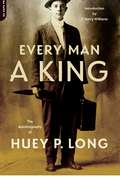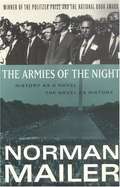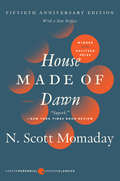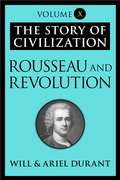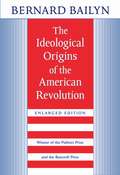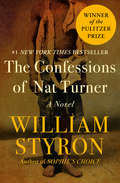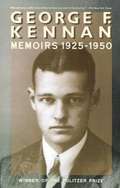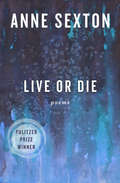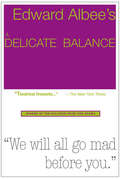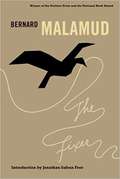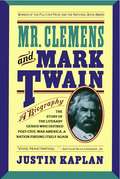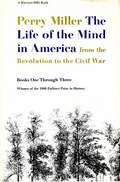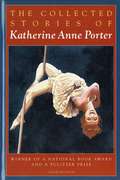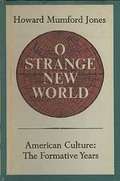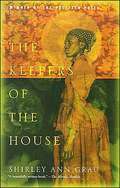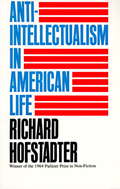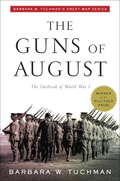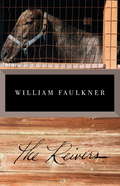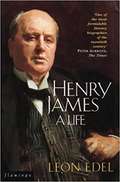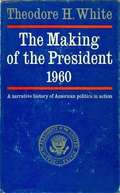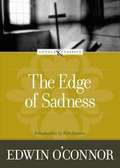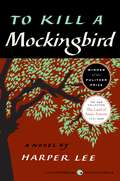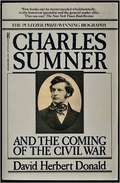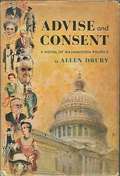Special Collections
Pulitzer Prize Award Winners
Description: Bookshare is pleased to offer the following titles, winners of the Pulitzer Prize Award. Note: Some drama winners are available and are listed under Fiction awards. #award
- Table View
- List View
Every Man A King
by Huey P. LongHuey Long (1893-1935) was one of the most extraordinary American politicians, simultaneously cursed as a dictator and applauded as a benefactor of the masses. A product of the poor north Louisiana hills, he was elected governor of Louisiana in 1928, and proceeded to subjugate the powerful state political hierarchy after narrowly defeating an impeachment attempt. The only Southern popular leader who truly delivered on his promises, he increased the miles of paved roads and number of bridges in Louisiana tenfold and established free night schools and state hospitals, meeting the huge costs by taxing corporations and issuing bonds. Soon Long had become the absolute ruler of the state, in the process lifting Louisiana from near feudalism into the modern world almost overnight, and inspiring poor whites of the South to a vision of a better life. As Louisiana Senator and one of Roosevelt's most vociferous critics, "The Kingfish," as he called himself, gained a nationwide following, forcing Roosevelt to turn his New Deal significantly to the left. But before he could progress farther, he was assassinated in Baton Rouge in 1935. Long's ultimate ambition, of course, was the presidency, and it was doubtless with this goal in mind that he wrote this spirited and fascinating account of his life, an autobiography every bit as daring and controversial as was The Kingfish himself.
So Human an Animal
by René DubosIn this collection of stories, the bizarre is rendered normal, the absurd hilarious and the incredible comprehensible. The re-imaginations of reality feature evocations of historical figures, over-televised game show hosts and late-night comedians.
Pulitzer Prize Winner
The Armies of the Night
by Norman MailerOctober 21, 1967. Washington DC. Protesters are marching to end the war in Vietnam, Mailer among them. From his perception of the day comes a work that shatters traditional reportage.
Winner of the Pulitzer Prize.
Winner of the National Book Award
House Made of Dawn
by N. Scott MomadayThe magnificent Pulitzer Prize-winning novel of a stranger in his native land A young Native American, Abel has come home from a foreign war to find himself caught between two worlds. The first is the world of his father's, wedding him to the rhythm of the seasons, the harsh beauty of the land, and the ancient rites and traditions of his people. But the other world -- modern, industrial America -- pulls at Abel, demanding his loyalty, claiming his soul, goading him into a destructive, compulsive cycle of dissipation and disgust. And the young man, torn in two, descends into hell.
Rousseau and Revolution
by Will Durant and Ariel DurantWinner of the Pulitzer PrizeA history of civilization in France, England, and Germany from 1756, and in the remainder Europe from 1715 to 1789.
The Ideological Origins of the American Revolution
by Bernard BailynIn this book, Bailyn discusses the intense, nation-wide debate on the ratification of the Constitution, stressing the continuities between that struggle over the foundations of the national government and the original principles of the Revolution.
Pulitzer Prize Winner
The Confessions of Nat Turner
by William StyronThe &“magnificent&” Pulitzer Prize–winning and #1 New York Times–bestselling novel about the preacher who led America&’s bloodiest slave revolt (The New York Times).The Confessions of Nat Turner is William Styron&’s complex and richly drawn imagining of Nat Turner, the leader of the 1831 slave rebellion in Virginia that led to the deaths of almost sixty men, women, and children. Published at the height of the civil rights movement, the novel draws upon the historical Nat Turner&’s confession to his attorney, made as he awaited execution in a Virginia jail. This powerful narrative, steeped in the brutal and tragic history of American slavery, reveals a Turner who is neither a hero nor a demon, but rather a man driven to exact vengeance for the centuries of injustice inflicted upon his people.Nat Turner is a galvanizing portrayal of the crushing institution of slavery, and Styron&’s deeply layered characterization is a stunning rendering of one man&’s violent struggle against oppression. This ebook features a new illustrated biography of William Styron, including original letters, rare photos, and never-before-seen documents from the Styron family and the Duke University Archives.
Memoirs (1925-1950)
by George F. KennanThe American diplomat's reflections of his years of government service provide insight into four decades of U.S. policy
Winner of the National Book Award
Pulitzer Prize Winner
Live or Die
by Anne SextonWinner of the Pulitzer Prize: A gripping poetry collection mapping the thorny journey from madness to hope With her emotionally raw and deeply resonant third collection, Live or Die, Anne Sexton confirmed her place among the most celebrated poets of the twentieth century. Sexton described the volume, which depicts a fictionalized version of her struggle with mental illness, as "a fever chart for a bad case of melancholy." From the halls of a psychiatric hospital--"the scene of the disordered scenes" in "Flee on Your Donkey"--to a child's playroom--"a graveyard full of dolls" in "Those Times . . ."--these gripping poems offer profound insight on the agony of depression and the staggering acts of courage and faith required to emerge from its depths. Along with other confessional poets like Sylvia Plath and Robert Lowell, Sexton was known for grappling with intimate subjects traditionally considered taboo for poetry such as motherhood, menstruation, and drug dependence. Live or Die features these topics in candid and unflinching detail, as Sexton represents the full experience of being alive--and a woman--as few poets have before. Through bold images and startlingly precise language, Sexton explores the broad spectrum of human emotion ranging from desperate despair to unfettered hope.
A Delicate Balance
by Edward AlbeeOne of Edward Albee's most celebrated works, A Delicate Balance premiered on Broadway in 1966 and won the Pulitzer Prize for Drama in 1967, the first of three he has received for his work. The play revolves around wealthy middle-aged couple Agnes and Tobias, who have their complacency shattered when their longtime friends Harry and Edna appear at their doorstep. Claiming an encroaching, nameless "fear" has forced them from their own home, these neighbors bring a firestorm of doubt, recrimination and ultimately solace, upsetting the "delicate balance" of Agnes and Tobias's household. In recent years, A Delicate Balance has enjoyed many and new stunning revivals, running now, including a Broadway production in 1996, which won the Tony Award for Best Revival, and another at the Alameida Theatre in London in 2011.
The Fixer
by Bernard MalamudWinner of the Pulitzer Prize and the National Book Award for Fiction, this magnificent novel is the story of an ordinary man accused of "ritual murder" and of his heroic victory over almost incredible brutality and degradation.
Mr. Clemens and Mark Twain
by Justin KaplanMark Twain, the American comic genius who portrayed, named, and in part exemplified America's "Gilded Age," comes alive -- a presence felt, an artist understood -- in Justin Kaplan's extraordinary biography.
With brilliant immediacy, Mr. Clemens and Mark Twain brings to life a towering literary figure whose dual persona symbolized the emerging American conflict between down-to-earth morality and freewheeling ambition. As Mark Twain, he was the Mississippi riverboat pilot, the satirist with a fiery hatred of pretension, and the author of such classics as Tom Sawyer and Huckleberry Finn. As Mr. Clemens, he was the star who married an heiress, built a palatial estate, threw away fortunes on harebrained financial schemes, and lived the extravagant life that Mark Twain despised. Kaplan effectively portrays the triumphant-tragic man whose achievements and failures, laughter and anger, reflect a crucial generation in our past as well as his own dark, divided, and remarkably contemporary spirit.
The book begins as the thirty-one-year-old Mark Twain, carrying bottled within himself the experience of his boyhood in Hannibal and his coming-of-age on the Mississippi and on Nevada's silver-rush frontier, quits San Francisco and the old elemental America of the open spaces. He is heading east for the burgeoning new urban America of commerce, invention, finance, and status, where he is destined to marry well, hobnob with the rich and influential, throw away fortunes on tragically alluring schemes...and produce literary works that fulfill and go beyond the vocation he has already acknowledged: "to excite the laughter of God's creatures." He is heard, seen, made palpable. The texture of his marriage with Olivia Langdon, the protean presence of Mark Twain on the lecture platform, his friendships and enmities -- virtually all his closest relationships partook of both -- spring to life. His writing and publishing experience is organically re-created. His endurance in the face of personal tragedy, his unrivaled charm, his compulsion to quarrel, his humility and his vanity are evoked and felt. His wit rings through the book. "Honest poverty is a gem that even a King might be proud to call his own, but I wish to sell out. I have sported that kind of jewelry long enough." Thus the young Mark Twain, on the eve of world fame, spoke his disgust at a money-centered society in that blatantly philistine voice that he chose for his most savage satirical declarations. But all his life -- racked by his own ambivalences -- he was to embrace the values of that society. Mr. Clemens and Mark Twain brilliantly conveys this towering literary figure who was himself a symbol of the peculiarly American conflict between moral scrutiny and the drive to succeed. Mr. Clemens lived the Gilded Life that Mark Twain despised. The merging and fragmenting of these and other identities, as the biography unfolds, results in a magnificent projection of the whole man; the great comic spirit; and the exuberant, tragic human being, who, his friend William Dean Howells said, was "sole, incomparable, the Lincoln of our literature."
Winner of the National Book Award
Pulitzer Prize Winner
The Life of the Mind in America
by Perry MillerDiscussion of the intellectual climate of the age.
Pulitzer Prize Winner
The Collected Stories of Katherine Anne Porter
by Katherine Anne PorterPorter’s reputation as one of Americanca’s most distinguished writers rests chiefly on her superb short stories. This volume includes the collections Flowering Judas; Pale Horse, Pale Rider; and The Leaning Tower as well as four stories not available elsewhere in book form.
Winner of the National Book Award and the Pulitzer Prize.
O Strange New World
by Howard Mumford JonesDescribes the discovery, the invention, the definition, and the self-realization of America, and the elusive sense of the wonder and excitement of the unveiling of a new world.
Pulitzer Award winner.
The Keepers of the House
by Shirley Ann GrauA novel that follows 7 generations of the Howland family and the community they build around themselves in rural Alabama.
Pulitzer Prize Winner
Anti-Intellectualism in American Life
by Richard HofstadterAnti-Intellectualism in American Life was awarded the 1964 Pulitzer Prize in Non-Fiction. It is a book which throws light on many features of the American character. Its concern is not merely to portray the scorners of intellect in American life, but to say something about what the intellectual is, and can be, as a force in a democratic society.
The Guns of August
by Barbara W. TuchmanIn this landmark account, renowned historian Barbara W. Tuchman re-creates the first month of World War I: thirty days in the summer of 1914 that determined the course of the conflict, the century, and ultimately our present world. Beginning with the funeral of Edward VII, Tuchman traces each step that led to the inevitable clash. And inevitable it was, with all sides plotting their war for a generation. Dizzyingly comprehensive and spectacularly portrayed with her famous talent for evoking the characters of the war’s key players, Tuchman’s magnum opus is a classic for the ages.
Pulitzer Prize Winner
The Reivers
by William FaulknerOne of Faulkner's comic masterpieces, The Reivers is a picaresque that tells of three unlikely car thieves from rural Mississippi. Eleven-year-old Lucius Priest is persuaded by Boon Hogganbeck, one of his family's retainers, to steal his grandfather's car and make a trip to Memphis. The Priests' black coachman, Ned McCaslin, stows away, and the three of them are off on a heroic odyssey, for which they are all ill-equipped, that ends at Miss Reba's bordello in Memphis. From there a series of wild misadventures ensues--involving horse smuggling, trainmen, sheriffs' deputies, and jail.
Pulitzer Prize Winner
Henry James
by Leon EdelThis is the one-volume edition of a famous biography of Henry James. Born in America, Henry James was educated both there and in Europe before settling in London, where he was to spend most of his life, in 1876. His novels represent the culmination of the 19th-century realist tradition of Austen, George Eliot, Flauberty and Balzac, and a decisive step towards the experimental modernism of Woolf and T.S. Eliot. His works often focus upon an innocent American in Europe, and assess the qualities and dangers of both American and European culture at the time, as well as showing their vast differences. "A Portrait of a Lady", "The Ambassadors" and "The Golden Bowl" all explore this subject, whilst Honore de Balzac's "Eugenie Grandet" was so admired by James that he was inspired to write "Washington Square", his own version of the tale. James's works explore sexual roles, feminism and class conflict.
Winner of the National Book Award
Pulitzer Prize Winner
The Making of the President, 1960
by Theodore H. WhiteThe greatest political story ever told—the epic clash between John F. Kennedy and Richard M. Nixon, as captured in Theodore White's dramatic and groundbreaking chronicle
The Making of the President 1960 is the book that revolutionized—even created—modern political journalism. Granted intimate access to all parties involved, Theodore White crafted an almost mythic story of the battle that pitted Senator John F. Kennedy against Vice-President Richard M. Nixon—from the decisive primary battles to the history-making televised debates, the first of their kind. Magnificently detailed and exquisitely paced, The Making of the President 1960 imbues the nation's presidential election process with both grittiness and grandeur, and established a benchmark against which all new campaign reporters would measure their work.
Pulitzer Prize Winner
The Edge of Sadness
by Edwin O'ConnorThis haunting novel shattered reigning cultural stereotypes of priests and parish life when it was first published. Father Hugh Kennedy is a recovering alcoholic, committed to his vocation, yet struggling with the demands of it. The Edge of Sadness is a sensitive portrait of both one man's inner life and the mid-20th century transformation of ethnic Catholicism.
Pulitzer Prize Winner
To Kill a Mockingbird
by Harper LeeLook for The Land of Sweet Forever, a posthumous collection of newly discovered short stories and previously published essays and magazine pieces by Harper Lee, coming October 21, 2025.Voted America's Best-Loved Novel in PBS's The Great American ReadHarper Lee's Pulitzer Prize-winning masterwork of honor and injustice in the deep South—and the heroism of one man in the face of blind and violent hatredOne of the most cherished stories of all time, To Kill a Mockingbird has been translated into more than forty languages, sold more than forty million copies worldwide, served as the basis for an enormously popular motion picture, and was voted one of the best novels of the twentieth century by librarians across the country. A gripping, heart-wrenching, and wholly remarkable tale of coming-of-age in a South poisoned by virulent prejudice, it views a world of great beauty and savage inequities through the eyes of a young girl, as her father—a crusading local lawyer—risks everything to defend a black man unjustly accused of a terrible crime.
Charles Sumner and the Coming of the Civil War
by David Herbert DonaldIn a period when senators exercised more influence than presidents, Senator Charles Sumner was one of the most powerful forces in the American government. His uncompromising moral standards made him a lightning rod in an era fraught with conflict.
Pulitzer Prize Winner
Advise and Consent
by Allen DruryThe United States Senate reacts to the nomination of Robert Leffingwell, a former Communist Party member, as United States Secrety of State.
Winner of the Pulitzer Prize.
